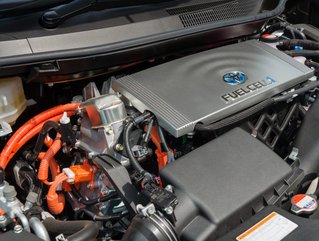Toyota to build the first megawatt-scale fuel cell power generation plant

Toyota Motor North America is set to build the world’s first megawatt-scale carbonite fuel cell power generation plant.
It will have a hydrogen fuelling station to support the company’s operations at the Port of Long Beach, and will use bio-waste sourced from California agricultural waste for generation of water, electricity, and hydrogen. The plant was announced at the Los Angeles Auto Show earlier today.
The Tri-Gen plant will come online in 2020, and generate approximately 2.35 megawatts of electricity and 1.2 tons of hydrogen per day. This is the equivalent of around 2,350 average-sized homes and meet the driving needs of 1,500 cars a day. Toyota’s power generation facility will be 100% renewable and supply to the Logistics Services operations at the Port, making it the first Toyota facility in North America to use entirely green energy.
- RELATED STORIES:
- Mazda, Toyota, and Denso team up to create EV technology
- Toyota celebrates 25 years of supporting other businesses
- Toyota to invest £240m in Burnaston factory
"For more than twenty years, Toyota has been leading the development of fuel cell technology because we understand the tremendous potential to reduce emissions and improve society," said Doug Murtha, Group Vice President- Strategic Planning. "Tri-Gen is a major step forward for sustainable mobility and a key accomplishment of our 2050 Environmental Challenge to achieve net zero CO2 emissions from our operations."
This is a key step in Toyota’s ongoing work to develop a hydrogen society. The facility will supply all Toyota fuel cell vehicles moving through the port as well as serving as a key proof-of-concept for 100% renewable, local hydrogen generation. The vehicles involved include the Miraj sedan and Project Portal, the Heavy Duty hydrogen fuel cell class 8 truck. The hydrogen fuelling station was developed with the help of Air Liquide.
Toyota intends to continue its commitment to supporting the development of a consumer-facing hydrogen infrastructure, to realise the potential of fuel cell vehicles. The company is even partnering with Shell – the first such collaboration between a major automotive manufacturer and a global oil corporation.






